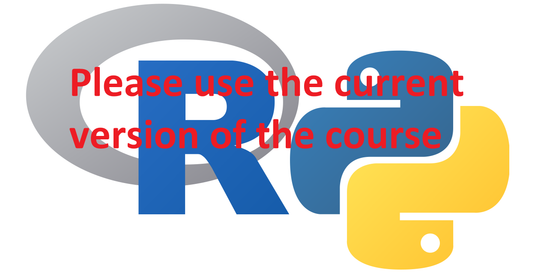
This is a past course: please register in the current course version.
Basic concepts of programming in Python and R for Digital Health.
This course is open to anyone interested in learning to code, also outside of the field or the HPI master program. Some of the exercises are health-related :)
Language: English
Course information
This is a past course: please register in the current course version.
Welcome to the course "fundamentals of programming for digital health" by Berry Boessenkool at the chair of Bert Arnrich, Digital Health Cluster, Hasso Plattner Institute in Potsdam.
This course is open to anyone at anytime if you want to write good code. With the videos and autograded exercises, you can learn a lot!
The tutorial sessions are primarily aimed at the Digital Health master students, but usually some seats are still available, so while the course is running, feel free to join :).
Topics include data structures, program control statements (conditional execution, loops, etc.), data input/output, analysis and visualization for Python (6 weeks, 2024-10-14 to 11-18) and R (9 weeks, 2024-11-25 to 2025-02-04), see details below.
The course is set up to technically require no previous programming skills. However, if you have little coding experience, you'll have to spend more time on this course than expected by the credit points. The weekly time requirement is between 7 and 11 hours for most participants in past years.
You can prepare for R ahead of the semester with my short R course if wanted.
The lectures are presented in short online videos accompanied by interactive programming exercises through CodeOcean. They can be watched / solved at your own time and pace.
The tutorial sessions take place in person on Mondays (13:30-15:00) in G2.U.10 (Campus III, Digital Health Center, basement floor).
The Tuesday timeslot is not used on our side.
The tutorials are designed to:
- answer your questions and those posed by others
- look at your code for things that may be optimizable or even bad habits
Grading is based 50/50 on separate Python (November 25) and R (February 10/17) exams.
Course contents
P1: intro & functions:
Python intro, syntax, data types, character strings, writing functionsP2: objects:
Collections (overview), lists, sets, tuples, dictionariesP3: loops:
conditional code execution, loops, list comprehensionP4: programming:
managing errors, writing classes, unit testsP5: data science:
numpy, pandas, missing values, applicationsPython exam:
Nov 25R1: intro:
welcome, showcase, configuration (R & Rstudio), interactive exercises, syntax, help, vectorsR2: basics:
statistics, functions, conditions, packagesR3: data types:
logicals, charstrings, categories, overviewR4: objects:
data.frame, matrix, list, arrayR5: real data:
read, merge, missing values, sourcesR6: plots:
scatterplots, line plots, barplots, low level commandsR7: figures:
composition, histograms, boxplots, exporting, outlookR8: flow control:
debugging functions, loopsR exam:
Feb 17
Enroll me for this course
Learners
This course is offered by

Berry Boessenkool has been teaching R courses in various formats since 2012. He is a freelance R trainer and consultant and works part-time as a lecturer at HPI. His passion for programming was sparked in his studies of geoecology and the analysis of environmental data is still close to his heart.

Prof. Dr.-Ing. Bert Arnrich is Professor for Digital Health – Connected Healthcare at the Digital Health Center of the Hasso Plattner Institute.
His research on ubiquitous sensing and computing technologies is directed towards paving the way for transforming healthcare systems from purely managing illness to maintaining wellness everywhere, anytime and for anyone. He has been a PI in several European and national projects. He has co-authored over 120 refereed research publications.
He studied "Informatics in the Natural Sciences" and received the PhD degree Dr.-Ing. for the thesis "Data Mart Based Research in Heart Surgery" from Bielefeld University in 2006. He established and headed the research group Pervasive Healthcare in the Wearable Computing Laboratory at ETH Zurich between 2006 and 2013. He received an EU FP7 Marie Curie Cofound Fellowship in 2013 and was appointed to tenure track professorship at the Computer Engineering Department at Bosporus University until 2017. Between 2017 and 2018 he worked as a Science Manager for Emerging Technologies at Accenture Technology Solutions.